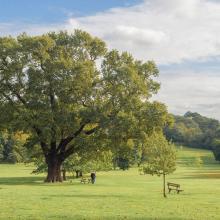Taking an economic lens to our Future Energy Scenarios
11 Dec 2025 - 3 minute read
Sign in to add this page to your favourites
Sign in or registerSign in or register to manage your favourites
Sign in or register
Assistance dogs can have such a life-changing impact on people with disabilities and ongoing medical conditions, and we’re thrilled to share two stories from our colleagues at the ESO about their experiences this International Assistance Dog week.
Claire Huxley, Revenue & Settlements Senior Manager, shares her experience of being a guide dog boarder and Philippa Banks, Balancing Trials Specialist, explains the impact an assistance dog has had on her and her daughter’s life.
My daughter Jemima’s assistance dog Albert has changed her life. He was trained by Dogs for Good to help her with things like taking off jumpers, coats and socks, picking things up for her, retrieves her medication or slippers, opens doors and will load and unload the washing machine. These all enable her to live life more independently. She has just completed a paralegal apprenticeship in Birmingham and Albert keeps her safe when they’re out as he’s a visible sign that she might need help.
It can be hard to ask for help, so Albert enables Jemima to start conversations and get the help she needs, whether a seat on a train, opening doors or help in a supermarket. Albert is very happy when working; his tail wags and he looks at Jemima for the next request if he hasn’t already anticipated it. When she’s working at home, he sometimes brings her things he thinks she might want: shoes, his toys and even paper from the bin. I say he’s looking for treats but Jemima says he's trying to be helpful. Albert’s joy in life is infectious and he brings us lots of laughter.

I first became involved with Guide Dogs for the Blind when I was eight. My parent’s walked Rupert, a beautiful bundle of yellow Labrador for a year. We taught him the foundational skills to being a guide dog; walking calmly on his lead, simple commands, staying calm and just generally being a nice dog to have around the house. At about a year old he was whisked off to big school where he was taught the skills to become a guide dog. Over the new few years, a steady stream of puppies came and went, five in total.
Fast forward ten years, and I was desperate for a dog. Working full-time in the office, it didn’t feel right to have a dog at that time. I still had a few connections to the Guide Dog charity and became aware that you could board a dog that was at school. The premise is simple; a dog does better living with a family and having some time after training to decompress and be themselves than being in kennels overnight. The dog is dropped off in the morning, does their training, and is picked up after they finish. Food is provided by the charity, and they are looked after when they are poorly and when you go on holiday. A boarder’s role is to provide a safe and calm environment for the dog to relax. Boarding is a key part of the training programme – without the army of volunteers who support the programme, guide dogs would struggle to train the number of dogs needed.
I applied to be a boarder in 2018 and haven’t looked back since. My partner and I have boarded 14 or so dogs now who join us at around 14months old and stay with us for about four months for their early training where they are taught the foundation skills to be a guide dog. Nine of our dogs have gone on to change someone’s life. We get such a sense of achievement when their graduation photo through and knowing they are helping someone live an independent and safe life gives us a massive sense of fulfilment. It is hard to say goodbye, but we love doing something positive that makes a difference to people’s lives.
The organisation is always on the look-out for more boarders as they are trying to catch up after COVID. COVID halted the breeding programme, the impact of which is still being felt now. The wait for a guide dog can be up to two years, which is a massive time to be without a lifeline to independent living.